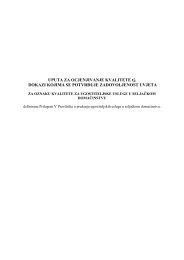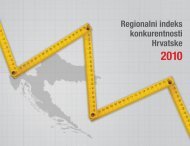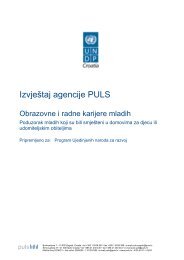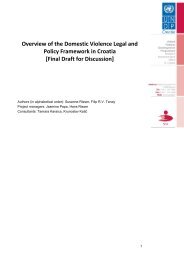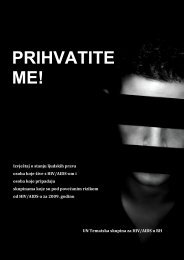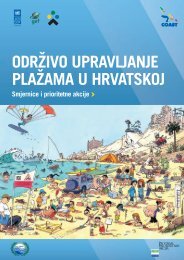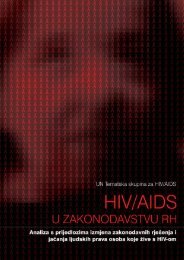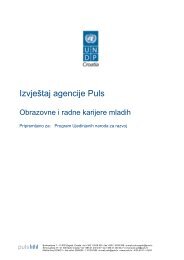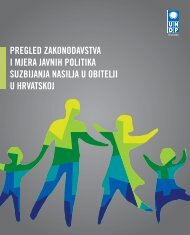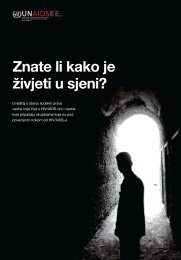WEB engleska verzija end.indd - UNDP Croatia
WEB engleska verzija end.indd - UNDP Croatia
WEB engleska verzija end.indd - UNDP Croatia
- No tags were found...
You also want an ePaper? Increase the reach of your titles
YUMPU automatically turns print PDFs into web optimized ePapers that Google loves.
CHAPTER 3THE SOCIALLY EXCLUDEDcountries felt this way (Baloban, 2005: 264). Furthermore,68% of <strong>Croatia</strong>ns interviewed believed that homosexualitycannot be justified under any circumstances, whilethe percentage was nearly half that (or 39%) in the restof Europe (Baloban, 2005: 309). The only countries whichindicated a higher level of homophobia than <strong>Croatia</strong>were Latvia, Lithuania, Hungary, Romania and Turkey(Baloban, 2005: 172).In political discourse, objections to granting equal rightsto homosexuals are closely connected to references tothe traditional national identity, just as an individual’s ora community’s level of religiosity (irrespective of the ageand education) is often a good predictor of negativeattitudes towards homosexual relationships (Štulhoferand Brajdić Vuković, 2004). In view of the prominentpublic role and influence of the Church in the formationof moral values (Škrabalo and Jurić, 2005), the religiousinterpretation of homosexuality has an undoubtedlystrong effect on the vulnerability of sexual minorities.Although the Church does not officially reject peoplewho have an inclination towards those of the same sex(considered to be a matter of personal choice) and doesnot support discrimination against them, it still viewshomosexual activity to be unnatural and sinful. 159 Manychurch groups interpret the fight of homosexuals forequal rights to be a sign of a deep moral crisis, and a newthreat to the family, “the most basic social institution.”Human rights violations against the members of sexualminorities t<strong>end</strong> to relate to a denial of rights related tomarriage, violations of dignity and physical integrity 160(harassment and abuse in public places), and discriminationin the workplace. 161 Currently, same-sex couplesonly receive rights protection after their relationship hasconcluded (if they can prove that they lived togetherfor three years or more). Retroactively they can receivethe right to support and the right to the division of theircommon estate. By comparison, heterosexual couplesgain over 60 rights once their marriage has concluded,and 29 rights can be exercised by persons in extramaritalunion (Bagić and Kesić, 2006).There are many personal testimonies about the humiliationand violence that homosexual individuals are exposedto because of their sexual preferences, however,reliable data on this phenomena is lacking. In 2002, alegal team employed by the Iskorak and Kontra associationsdocumented cases of 25 physical assaults onhomosexuals, which is dramatically different from thedata gathered in the first national study on violenceagainst sexual minorities. According to the nationalsurvey conducted on a random sample of 200 sexualminority members, 14.4% of interviewees had experiencedphysical violence over a period of 36 months.More than 56% had been exposed to insults and/orthreats (Pikić and Jugović, 2006). More than half had afri<strong>end</strong> or partner who had been the victim of (physical)violence because of his/her sexual orientation. Boththe violence and harassment most frequently happenedin open public places and the perpetrators wereusually unknown to the victim.Cases of police misconduct towards sexual minoritiesalso lacks documentation. However, accordingto several testimonies about the provocation andhumiliation of transsexuals, a recent survey suggeststhat the unwillingness to report violence could be theresult of inappropriate police behaviour towards thevictims. One-fifth (22%) of those who experiencedviolence because of their sexual orientation reportedit to the police, but for one in four this resulted infurther embarrassment (Pikić and Jugović, 2006).Box 21: An IncidentEarly in the morning on March 4, 2006, a group ofat least four young men entered a closed party inSantos, a Zagreb club, which was organized by anassociation promoting the rights of homosexuals.The young men attacked individuals att<strong>end</strong>ing theparty injuring eight people. The police managed toarrest two of the attackers and laid on misdemeanourcharges. Iskorak and Kontra, the associations thatpromote the rights of homosexuals, describedthe attack as a hate crime and filed a complaint.However, after conducting a criminal investigationas a result of public pressure and an interventionby the G<strong>end</strong>er Equality Ombudsman, the ZagrebPolice portrayed the entire incident as a “typical barfight” (Grdjan, 2006).118159 For an identical, elaborated and biblically argumented standpoint of the Protestant Church, compare the Report of The EvangelicalAlliance (UK) Commission on Unity and Truth among Evangelicals (ACUTE, 2005).160 As demonstrated by the threats, stone throwing and tear-gasing on the first gay pride parade in Zagreb in June 2002. All parades helduntil now were secured by a large number of policemen (sometimes comparable to the number of participants) in full riot gear.161 This does not exhaust the whole range of violations of human and civil rights of the members of sexual minorities. It should be pointedout that transsexual persons who do not undergo surgery can not change their sex in personal documents, as opposed to those who havemade surgical transition.



